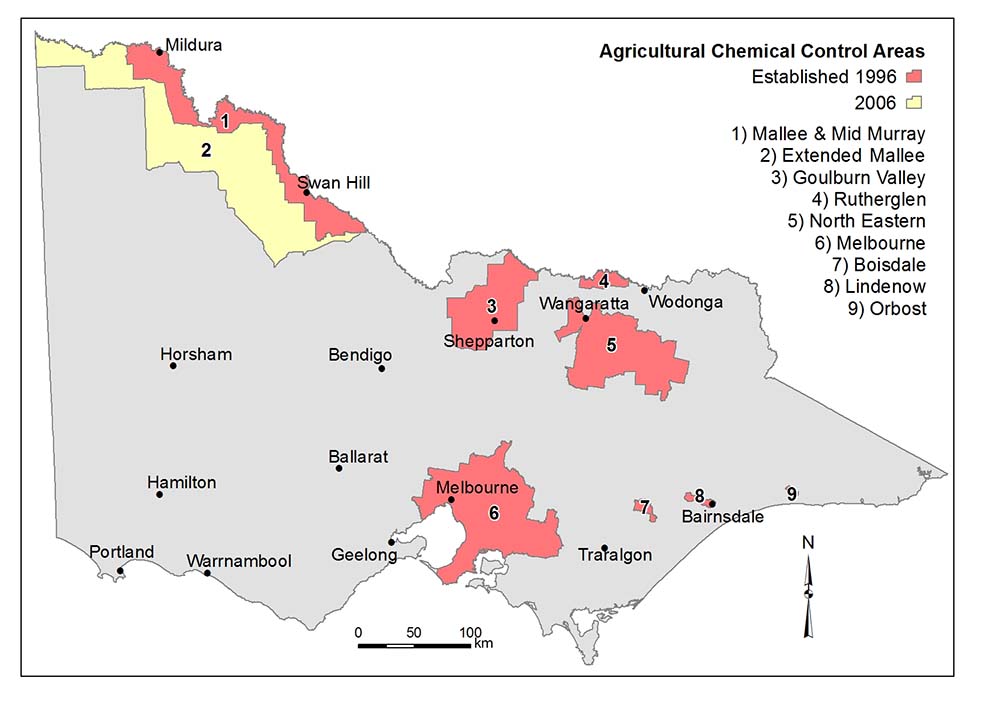Agricultural chemical control areas
Nine agricultural chemical control areas (ACCAs) are established in Victoria to protect high-value herbicide-sensitive crops. Within these areas, restrictions apply to the types of herbicides, the method of application and the periods in which certain chemicals can be used.

Dates ACCA restrictions are operational
| ACCA | Start date | Finish date |
|---|---|---|
| Melbourne | All year | All year |
| Lindenow | All year | All year |
| Orbost | All year | All year |
| Boisdale | All year | All year |
| Mallee and Mid-Murray | August 1 | April 30 following year |
| Extended Mallee | August 1 | April 30 following year |
| Goulburn Valley | September 1 | April 30 following year |
| North Eastern | September 1 | April 30 following year |
| Rutherglen | September 1 | April 30 following year |
To check if the location you intend to spray is within an ACCA, access larger maps for each ACCA via the following links:
- Melbourne
- Lindenow
- Orbost
- Boisdale
- Extended Mallee and Mallee Mid-Murray
- Goulburn Valley
- North Eastern
- Rutherglen
Chemicals prohibited in ACCAs
These chemicals are prohibited to be applied in ACCAs by the specific method.
| ACCA | Chemical | Prohibited method |
|---|---|---|
| All ACCAs except Extended Mallee |
| Aerial spraying or mister application |
| All ACCAs except Extended Mallee | Ester formulations of 2,4-D, 2,4-DB or MCPA | All methods of application |
| Extended Mallee only | Ester formulations of Triclopyr | Aerial spraying or mister application |
| Extended Mallee only | Ester formulations of 2,4-D or MCPA | All methods of application |
Chemicals prohibited in ACCAs unless permit granted
These chemicals are prohibited to be applied by a specific method unless a valid ACCA permit has been granted (skip to this section below). An ACCA permit is different to an agricultural chemical user permit (ACUP).
| ACCA | Chemical | Prohibited method |
|---|---|---|
| All ACCAs except extended Mallee |
| Aerial spraying or mister application |
Check the product for prohibited chemicals
To determine if a product contains a prohibited ACCA chemical:
- read the chemical's product label and accompanying information sheet or
- search the Australian Pesticides and Veterinary Medicines Authority (APVMA) PubCRIS database.
Chemicals that are not prohibited for use within an ACCA must be used in accordance with the label directions. Chemical users are reminded to read the product label thoroughly and apply agricultural chemicals responsibly.
What is mister application?
A mister is spraying equipment that uses air for dispersing the spray. It includes:
- mist blowers, orchard sprayers, air blast sprayers, air shear sprayers
- any other spraying equipment that produces a droplet size spectrum that is classified as fine or very fine under ASAE S572 FEB04, Spray Nozzle Classification by Droplet Spectra.
It does not include air assisted boom sprayers or twin fluid nozzle sprayers.
ACCA permits
An ACCA permit allows specified chemical use in an ACCA that would otherwise be prohibited.
The application fee for a permit to carry out specified spraying in an ACCA under Section 39(3) of the Agricultural and Veterinary Chemicals (Control of Use) Act for the current year is $1,949.95 unless you can demonstrate one of the following exemptions:
- The area is too steep to safely conduct ground-based spraying.
- The area is too rocky or uneven to safely conduct ground-based spraying.
- The area is too waterlogged to safely conduct ground-based spraying.
- Other (specify).
While an ACCA permit allows specified spraying activities to take place, it does not replace approvals that might be required from other agencies or authorities. For example, approval from the Department of Infrastructure and Regional Development or the airport operator may be required to carry out controlled activities in Melbourne Airport's protected airspace.
How to get an ACCA permit
To get an ACCA permit:
- Determine which ACCA the land you intend to spray falls into.
- Determine what specific ACCA herbicide use restrictions apply at which time of the year.
- Determine if an ACCA permit can be granted for your proposed herbicide use.
- Identify potential risks of your proposed herbicide use and assess if they can be managed appropriately. Consider using a different chemical and or application method to minimise risks.
- If you decide the spraying is necessary and have thoroughly thought through how to minimise the risks, you can choose to apply for an ACCA permit.
- Complete and return the ACCA permit application form:
ACCA permit application form [MS Word Document - 804.4 KB]
[MS Word Document - 804.4 KB]
ACCA permit application form – accessible [MS Word Document - 808.6 KB]
[MS Word Document - 808.6 KB] - An Agriculture Victoria officer will contact you about your application and will likely need to visit and inspect the target area.
Agriculture Victoria does not make recommendations for chemical use or provide agronomic information. Advice should be sought from your local chemical reseller, agronomist or consultant before submitting an application.
Please ensure you submit your ACCA application form at least 4 weeks before the time you intend carry out the spraying, to allow enough time for processing. Only completed forms including the required map will be accepted.
Once your ACCA permit has been granted, you are responsible for ensuring that the chemical user is aware of their chemical use obligations and understands that this permit does not absolve them of the risks associated with chemical use in areas of high-value, herbicide-sensitive crop production.
Keep records of chemical use
All users of agricultural and veterinary chemicals, including pilots, are required to keep specified records for the use of chemical products, within 48 hours of using the chemical product, and to keep these records for a period of two years.